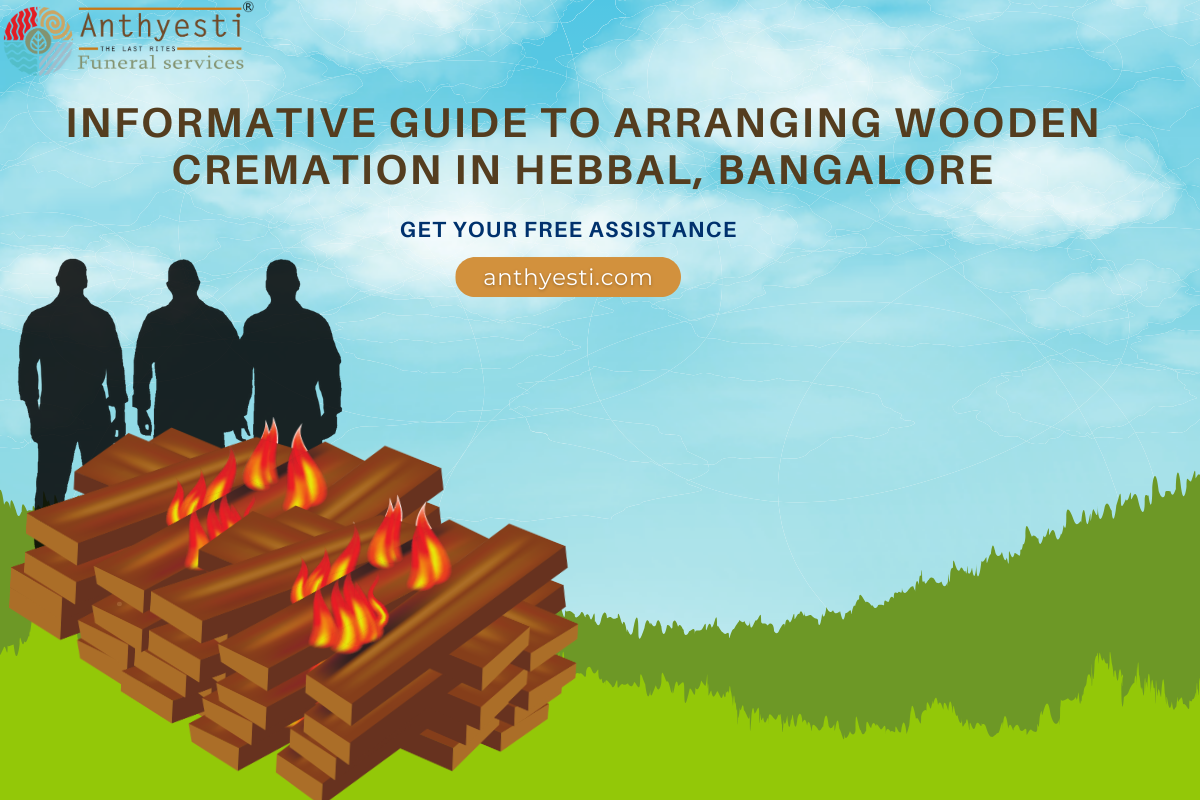A Step-by-Step Guide to Arranging Wooden Cremation in Hebbal, Bangalore
Arranging a dignified and respectful farewell for a loved one can be challenging, particularly in the midst of grief. For families in Hebbal, Bangalore, wooden cremation remains a meaningful choice, rooted in tradition and cultural significance. This guide provides detailed information to help you understand and organize the process smoothly, ensuring all customs are honored.
Step 1: Required Documentation and Permissions:
Wooden cremation requires specific documentation and permissions to proceed in compliance with local regulations. Key requirements include:
- Death Certificate: This can be obtained from the hospital or local government authorities.
- Identity Proof: Required for both the deceased and their next of kin.
- Local Permissions: Some circumstances may require a no-objection certificate (NOC) from local authorities.
- Cremation Slot Booking: Many cremation grounds require prior scheduling to allocate time slots.
Service providers, such as Anthyesti Funeral Services, can assist in acquiring and managing these documents to ensure a hassle-free process.
Step 2: Selecting a Cremation Ground in Hebbal:
Several cremation grounds in Hebbal offer wooden cremation facilities. Notable options include:
- Hebbal Crematorium: Recognized for its peaceful ambiance and well-maintained infrastructure.
- Kempapura Crematorium: Conveniently located with traditional wooden pyre arrangements.
Contact the crematorium to confirm availability and secure a slot based on your requirements.
Step 3: Procuring the Necessary Firewood:
A key aspect of wooden cremation is the procurement of firewood. While sandalwood is a traditional choice due to its fragrance, woods like mango and neem are commonly used for economic and ecological reasons.
- Wood Quantity: Confirm with the crematorium to determine the exact amount of wood needed.
- Sourcing: Anthyesti Funeral Services can help secure high-quality firewood, adhering to traditional standards.
Step 4: Gathering Ritual Supplies:
Rituals often involve specific items based on cultural practices. Essential supplies include:
- Combustion Aids: Ghee or oil to facilitate the fire.
- Sacred Items: Flowers, rice, and incense sticks.
- Shroud or Cloth: To wrap the body.
- Earthen Pot: For ceremonial water used in the final rites.
These items can be arranged through local vendors or via funeral service providers who ensure all supplies align with traditional needs.
Step 5: Arranging Transportation for the Deceased:
Transporting the deceased with respect and dignity is an essential step. Options include ambulances or hearses equipped for this purpose.
- Steps to Arrange Transport:
- Provide the service provider with the pickup address.
- Confirm the type of vehicle required.
- Ensure proper preservation and respectful handling during transit.
Anthyesti Funeral Services offers transportation options that prioritize care and respect.
Step 6: Conducting the Last Rites:
Last rites differ among cultural and religious traditions. In Hindu practices, the rites generally include:
- Purification: Sprinkling holy water or Ganga jal on the body.
- Chanting of Prayers: A priest or family member recites sacred hymns.
- Lighting the Pyre: Typically performed by the eldest son or a designated family member.
- Final Farewell: Friends and family pay their last respects.
Service providers can arrange priests or ritual specialists familiar with your community’s customs to guide these rites.
Step 7: Collecting and Immersing Ashes:
After the cremation process (which typically takes 3-4 hours), the ashes are collected in an urn for immersion in a sacred water body, marking the completion of the journey.
- Ash Collection: Coordinate with the crematorium staff to collect the remains.
- Immersion Locations: Popular choices near Bangalore include the Kaveri River or serene spots in Nandi Hills.
Step 8: Observing Post-Cremation Rituals:
Many families honor the departed through post-cremation ceremonies, such as:
- Pind Daan: Offerings made to ancestors for their peace.
- Charitable Acts: Donations made in the deceased’s memory.
- Pitru Paksha: Rituals performed during the mourning period to ensure the soul’s peace.
Comprehensive packages offered by Anthyesti include guidance and arrangements for these rituals.
Why Choose Anthyesti Funeral Services?
Anthyesti is dedicated to providing compassionate, efficient, and respectful funeral services, tailored to meet the needs of grieving families.
- Comprehensive Assistance: From paperwork to post-cremation ceremonies.
- Expert Team: Experienced in various cultural and religious traditions.
- Tailored Packages: Flexible options to suit individual requirements.
- 24/7 Support: Always available to address emergencies and queries.
Conclusion:
Organizing a wooden cremation in Hebbal can be a meaningful and respectful process with the right planning and assistance. Anthyesti Funeral Services is here to support you at every step, ensuring the rituals are performed with care and reverence. For any inquiries or to arrange services, feel free to get in touch.
FAQ’s:
Q1: What is the approximate cost of wooden cremation in Hebbal?
The cost depends on wood type, cremation ground charges, and other services. Typically, it ranges from ₹8,000 to ₹15,000. Anthyesti offers transparent pricing to help families plan accordingly.
Q2: Can I pre-book a cremation slot?
Yes, many crematoriums allow pre-booking. Anthyesti can facilitate the booking process for convenience.
Q3: Are priests available for conducting rituals?
Yes, experienced priests can be arranged to perform last rites as per the family’s traditions.
Q4: Is transportation assistance available?
Anthyesti provides specialized transport, ensuring dignity and respect during the journey.
Q5: How can I ensure an eco-friendly cremation?
Choose for biodegradable materials and sustainable wood options. Anthyesti also offers eco-friendly cremation services.
Call us at +91 87925 63332

